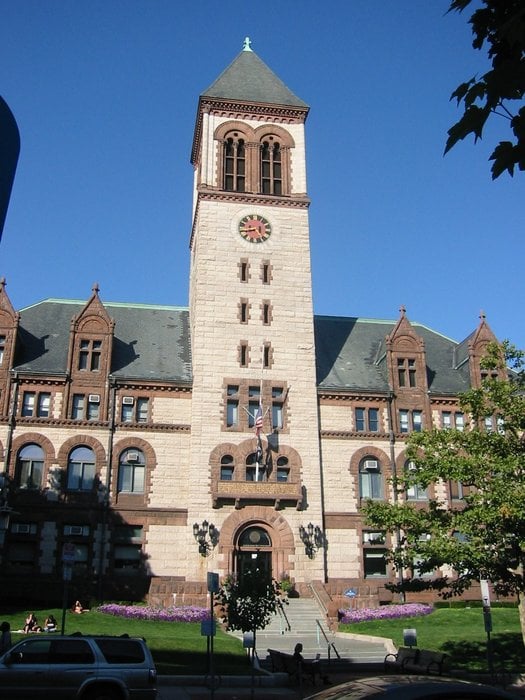Claudia B. and Hannah K. are Boston University YDSA co-chairs. For the past few months, they’ve been working on a campaign to get the tour guides of Boston University paid a fair wage. In honor of May Day, we’d like to kick off the first post on Boston DSA’s Political Education Working Group blog with an interview about their organizing work.
First off, could you tell us about the background on the tour guides campaign you’re working on?
Claudia: Tour guides at BU are not paid, but they do receive a hoodie. I was a tour guide last year and quit as I started to recognize the how exploitative the program was. Our members in Boston University YDSA were super into labor organizing so we were trying to find a campaign that had the potential for political education and a feasible goal, as well as one that allowed our members to practice organizing conversations and that wasn’t too risky.
Hannah: I’ve never been a tour guide, but I have a lot of close friends who are/have been and talking to them about their working conditions I definitely sensed dissatisfaction—which, of course, is the seed of any productive organizing conversation because it means you can get them pissed. In addition, it was a good starting point to get students at BU to start thinking about labor—because BU is such a bourgeois, “career-oriented” (yuck) school most people think it is fine to work for free for resume-building purposes (“paid in experience and connections”), so I think both of us recognized that a smaller campaign would have the potential to open people up to re-examine the work they do in their own lives. Because so much of the way a university operates depends on unpaid or underpaid labor: teaching assistants, student research, learning assistants, tour guides, etc, etc—we’ve actually heard a lot of people tell us that they didn’t think about the work they did that they weren’t paid for as “work” until now.
What has it been like organizing the tour guides? Are most receptive, or are some interested in maintaining the unpaid status of BU tour guides?
C: We have gotten a lot of support! We have over half of the current tour guides to sign the list of demands and a large number of past tour guides. There are some tour guides that are hesitant about the demand of a $15/hour wage. The largest backlash is from student employees in the office who are currently—there are some students who answer phone calls and check in parents who are paid less than $15/hour, and then there’s some that get a stipend to do more oversight of the tour guides. They’re opposed to them getting paid because they think it’ll lower their pay or make their positions less valuable. It’s been important in our organizing conversations to explain that it’s a “boss” problem not an “other workers” problem.
H: And also with the $15 thing we often ask: well, why isn’t everyone paid $15 an hour? And if they agree with that (and most do): aren’t the tour guides a good place to start? We have also gotten a few scab/cop types who argue that tour guides should remain volunteer because if they’re paid the position will attract the “wrong kind of people.” To which, a) wow, there’s a lot to unpack there but, b) you should be paid for work regardless of whether you like doing it or not.
What are your demands, and what has BU’s response been so far? How would you respond to statements that the tour guides would prefer to work for free?
C: The main demands include a $15/hour wage, the option to use work study awards to be paid, transparency about the requirements of the position, and a more thorough hiring practice, because currently the student workers in charge of hiring tend to just hire friends.
The biggest proponents of continuing this system are people who claim that making the position paid would attract the “wrong kind” of candidate. We argue this will attract the same, if not better, candidates. People who were already willing to do this for free will continue to be interested, and they will be more able to prioritize it as a job and keep it. Admissions has an issue with turnover with this current system. Additionally, admissions boasts of having diverse tour guides, yet a system of unpaid workers fundamentally seeks to exclude working class students. Another argument we sometimes hear is “if people ‘consented’ to work for free, it is entitled to change and ask for compensation now.” To this, we say that it is well within a worker’s rights to advocate for better working conditions at any time. Specifically, in such cases, students are fed lies about how such unpaid positions affect their later employability. As students come to realize these falsehoods, it is quite reasonable for them to change their expectations.
Hannah, you’ve written before about how BU has a long history of labor organizing. Are there any events in BU labor history that you’ve drawn from in this campaign?
H: When we first started BU YDS, I got really into researching BU’s history of student activism. The fact is BU used to be way more radical than it is now—you can find old pictures from BU in 60s and 70s online and they seem like another world. There are photos of BU undergrads protesting US involvement in Iran and protesting Robert McNamara speaking at BU! That would never happen here today! And while BU is very different today, there’s definitely been value in looking at our campaign as part of BU’s larger labor history. While I don’t think what we’re doing is anywhere near the scale of the ‘79 strike, I do think that looking at what we’re doing as part of a much greater movement allows us to look ahead in terms what we’re doing with our campaign—how can we try to transform the momentum we have with the tour guide campaign into something greater, and something that has the potential to energize the campus in the way it was back in the 70s? That I think is the bigger project, and something we’re thinking about a lot.
What are some challenges you’ve faced in your organizing campaign and how have you responded to them?
C: While I think all of BU YDSA is proud of the work we’ve done, I think we would’ve liked to center large groups of workers more than we were able to. The admissions office work is very isolated and makes organizing very difficult. All of the demands were crafted following one on ones with current and past tour guides. We were able to mobilize around 6-7 really amazing leaders to try to combat this. We are hopeful that the tour guides have been empowered to further advocate for their rights in the workplace despite these challenges.
H: I think—and this relates to what Claudia said about our issues centering workers—a big part of this is just that we’ve been so time-crunched in pulling this together. We had to spend the first half of the year building our YDS chapter so that essentially we’ve only had a semester to organize around this issue. If we had more time, I have no doubt we would have a stronger worker base, but the fact is we’re up against the university calendar and also Admissions’ calendar, as they are most vulnerable when turnover is high at the end of semesters.
It seems like the labor movement has grown from traditional unionizing campaigns to organizing more types of workers and different types of employment. Can you speak to how your campaign fits into that?
C: Hell yeah! We’re very excited about this. Unions rule but the fetishization of union workers takes away from all other labor struggles. This concern with only union labor also takes the focus away from marginalized workers as certain privileges and infrastructure are inherent to union organizing. That’s something I’m very proud of with regards to our campaign; there’s power in a union but ultimately it boils down to the people—
H: —also unions involve a lot of structure and regulation that ultimately isn’t workable in organizing all workplaces—
C: —definitely, and women of color are a huge exploited labor sector in terms of care work and people often ignore their organizing efforts because they can’t picket. While we obviously want the workers to see their demands realized and see BU respect its students’ requests, this campaign has had definite success. Whether in the mind of the tour guides themselves or their peers, a conversation has started about what it means to be a worker. There has definitely been increase in dialogue about how students are coerced into working for free. I think this lays a nice foundation to organize around internships, gig economy jobs, and other sources of precarious work or exploitation we have been told is necessary to attain success.
Anything else you’d like to add?
C: We are hoping to use the momentum from this campaign toward something like a campus wide $15 minimum wage—
H:—which is something that other student activists have started working towards. For example Virginia Tech’s YDSA is campaigning for campus-wide $15 now, and in addition, Rutgers has a very strong group of student activists fighting for $15 as well. Rutgers is also notable because it’s a state school, so winning $15 there actually helps to push New Jersey to make the state-wide minimum wage $15. We also think that $15 campus-wide minimum wage is achievable because it will benefit ALL BU workers, and not just student workers—it’s an easy sell: who doesn’t wanna be paid more?
For more information on the tour guides campaign, check out Hannah’s piece about BU’s labor history , or this piece from BU’s Daily Free Press about this specific campaign. To support this campaign, you can read their list of demands or sign their petition here. On May 4th at 3pm, a small group (per admission’s request) will be meeting with John McEachern and Kelly Walters. You can also show your support by walking with the organizers to this meeting. They will be meeting at 2:30pm at Marsh Chapel. Supporters are encouraged to wear BU colors or apparel to show this is really about creating a better community. Please click GOING on the Facebook event if you are going so they can keep track of numbers!



Leave a Reply